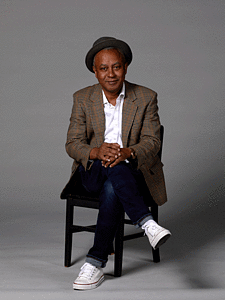Richard Merritt

About
Richard has been a Professor of Art at Luther College since 1998. He teaches Drawing, Critical Theory, and Art and Technology courses.
Richard is a trans-disciplinary artist whose work sits at the cross roads of aesthetic object, social practice arts, and scholarship. He has exhibited, published, and presented his research in a wide variety of disciplines, most recently at Oxford University, U.K. and Kyoto, Japan. His scholarly work has appeared in numerous publications, among them Leonardo Journal of Arts and Sciences of the MIT Press, as well as the proceedings of the Institute of Electrical and Electronic Engineers.
Selected Recent Scholarship
- Absence of Bravery: African American Masculinity and the Construction of the Hero Narrative During the World Wars, Liverpool Hope University, Liverpool, UK 2015
- The Computational Body, Composite Bodies and Post Human Prototypes In Contemporary Performing Arts, University of Ghent, Ghent, Belgium 2015
- Invisible Geographies: Violence and Oppression in the Prison-Industrial Complex and Concentrated Animal Feeding Operations, National Conference of the American Association of Geographers, Tampa, Florida 2014
- Black Samurai Hip-Hop Blues JBSA Conference Ritsumeikan University, Kyoto, Japan 2014
- A New Home: Memory, reminiscences and The End of Nostalgia Conference on Rethinking Diaspora, COMPAS, International Migration Institute Oxford University, Oxford, UK 2013
- Spectacle, A Theater of Influence: Magic, Misdirection and New Art, Eighth International Conference on the Arts in Society, Eötvös Loránd University, Budapest, Hungary 2013
- Combat Sport and Resistance: Documenting Resistance in North American Slave Narratives. International Sport and Society Conference, Cambridge University, UK 2012
Art 108 Foundations: Drawing
This studio course focuses on basic aesthetic and technical drawing skills through direct observation of three-dimensional objects in environments, with instructional emphasis on perspective, eye-hand coordination, proportion and scale, positive and negative space, and compositional structures.
Art 114 Sequential Art, Animation and the Graphic Novel
This studio course introduces students to the history, techniques and practice of sequential story telling from its beginnings to the contemporary graphic novel. Students will produce short animations, sequential art, and graphic novelettes.
ART 205 Art and Technology
This studio course examines the intersection of art and technology with particular attention to the ways that software, video, and interaction are used to produce emerging art forms and genres. Instruction will focus on object-oriented programming, application and algorithm design.
ART 208 Life Drawing
This studio course provides students with a thorough understanding of the structural anatomy of the human figure with emphasis on proportion, weight distribution, form and mass.
ART 231 4D Art Lab I
This studio course introduces students to time-based media in the production of contemporary art. Focusing on the way time engages and transforms Art production, students will explore digital video, performance art, and socially engaging art in a way that encourages disciplinary intersections.
Art 320 Critical Theory
An investigation of ideas that have informed and shaped the practice and understanding of art from the late 19th century to the present day. Students will engage in critical discourse, encounter texts that have changed our concepts of art, and hone their writing skills through the development of personal statements and written analysis of selected readings.
ART 331 4D Art Lab II
This course focuses on the artifact of time in 4D works. This studio art course moves students beyond the use of video and time-based media as art-making tools and asks them to consider the ways film, digital video, performance art, installation, and other time-based media impact our understanding of art and experience.
- M.F.A., Painting, University of Iowa
- B.A., Carleton College